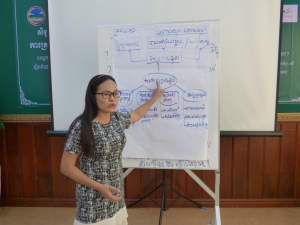Regional Integrated Coastal Management training course extended to Cambodia
Location: Kampot, Cambodia. 25th Sep 2017
ICM training workshop group photo
Participants included coastal management practitioners from provincial governments and IUCN staff. The course was taught by Vanny Lou, the Mangroves for the Future (MFF) national coordinator for Cambodia; instructors from the Royal University of Phnom Penh (RUPP); and guest speakers from RUPP, the Ministry of Environment, Fauna and Flora International (FFI) and Partnerships in Environmental Management for the Seas of East Asia (PEMSEA).
The short training course, which has been integrated into the RUPP’s academic programme, was developed as a result of MFF’s collaboration with the university to support their coastal management programme.
The recent training was designed to address work priorities as defined in the country’s National Strategy and Action Plan and the specific national ICM scaling-up initiatives which have been implemented by the Ministry of Environment. It also aims to build capacity for implementation of ICM and relevant policy, and to facilitate sharing of best practices in coastal and marine management among coastal and marine managers, coastal field practitioners and coastal and marine-focussed NGOs.
The course included a theory session, which took place at the Kampot Diamond Hotel in Kampot Province, and a practical field session, in which participants travelled to the Trapeang Sangke community fisheries. The field trip enhanced participants' knowledge about biodiversity use and conservation, land use change, climate change and adaptation and protected area management.
Q&A with community fisheries chief in Trapeang Sangke
“Participants were very active in discussion and sharing of their own experience in coastal and marine management and protection,” says Hoy Sereivatanak Reasey, principle instructor for the course. “The workshop provided them with information and analysis tools they can apply to their marine resource management.” He also noted that the workshop’s practical exercises gave participants a more thorough understanding of those tools through the opportunity to interact with them directly.
Hun Marady, a member of the ICM team for the Environment Department of Koh Kong Province, agrees. “I learned a lot about ICM in this course,” he says, “especially analysis tools. I will apply what I learned to new environmental plans in Koh Kong.”
Hun also suggested that a more “in-depth discussion of Project Cycle Management” – in his opinion, “the most powerful and important tool” that the course added to his repertoire – be undertaken at the next workshop.
A guest speaker gives a presentation on Project Cycle Management
Myanmar, Sri Lanka and Pakistan have also completed steps to integrate the ICM course at national education institutions. Pakistan has formally called for all national universities to implement the curriculum for the ICM course, and Sri Lanka’s Ocean University will implement its ICM graduate course starting in October. Myanmar will also begin developing ICM national courses, as well as vocational training for local government practitioners similar to the workshop conducted in Cambodia.

Presentating the results of a group discussion on Climate Ch ... , Kampot, Cambodia © MFF Cambodia